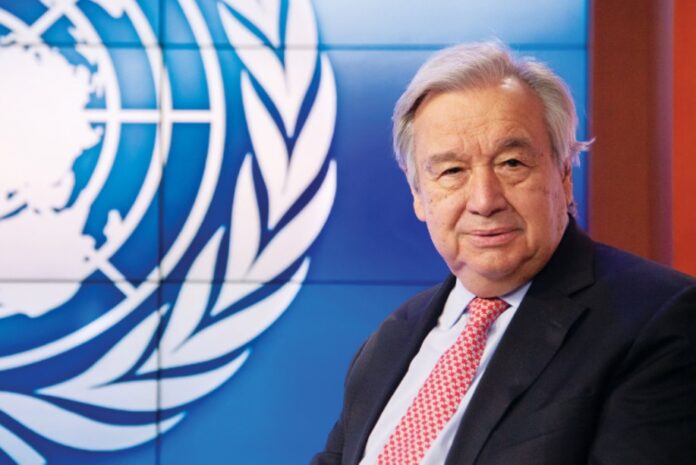THE SECRETARY-GENERAL
—
REMARKS TO THE MEDIA ON THE BLACK SEA GRAIN INITIATIVE
New York, 1 August 2022
[as delivered]
Good morning
A few hours ago, a cargo ship loaded with more than 26-thousand tonnes of corn became the first commercial ship to sail from the port of Odesa since 26 February.
It should arrive at the inspection location in Turkish territorial waters tomorrow, 2 August. Following inspection, it will proceed to its final destination in Tripoli, Lebanon – a country heavily dependent on grain imports.
This ship – the Merchant Vessel Razoni – is loaded with two commodities in short supply: corn, and hope.
Hope for millions of people around the world who depend on the smooth running of Ukraine’s ports to feed their families.
The ship’s departure is the first concrete result of the Black Sea Grain Initiative.
It has been a long journey since I presented a proposal to the leaders of the Russian Federation and Ukraine at the end of April.
Today’s departure is an enormous collective achievement by the Joint Coordination Centre, set up last week in Istanbul under United Nations auspices, with representatives from Ukraine, the Russian Federation, and Türkiye.
The Parties have worked tirelessly to reach this milestone, with the support of the United Nations and Türkiye.
After speaking to my colleagues, I know they worked practically all night, sleeping for just one hour – like all the other delegations at the Joint Coordination Centre.
It is thanks to their commitment that the Razoni was able to leave Odesa safely.
I salute their efforts, and I am grateful to Türkiye for its leadership.
What we’ve witnessed today in Odesa is an important starting point.
It must be the first of many commercial ships bringing relief and stability to global food markets.
The Black Sea Grain Initiative allows for significant volumes of exports from three Ukrainian ports: Odesa, Chornomorsk, and Yuzhny.
Together with the agreed facilitation of the unimpeded access of Russian food products and fertilizers to world markets, it will bring relief and stability to global food markets and help tackle the global food crisis.
Ensuring that grain, fertilizers, and other food-related items are available at reasonable prices to developing countries is a humanitarian imperative.
People on the verge of famine need these agreements to work, in order to survive.
Countries on the verge of bankruptcy need these agreements to work, in order to keep their economies alive.
In line with the humanitarian spirit of the initiative, the World Food Programme is planning to purchase, load and ship an initial 30,000 metric tons of wheat out of Ukraine on a UN-chartered vessel. WFP will have more details in the coming days.
While this tragic war continues to rage, the United Nations is working every day to bring relief to the people of Ukraine, and to those suffering the effects of the conflict around the world.
This war must end, and peace must be established, in line with the Charter of the United Nations and international law.
I hope today’s news can be a step towards that goal, for the people of Ukraine and the Russian Federation, and for the world.
Thank you.

